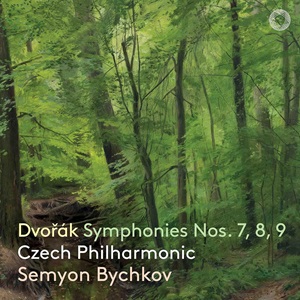
Antonín Dvořák (1841-1904)
Symphony No 7 in D minor, Op 70 (1885)
Symphony No 8 in G major, Op 88 (1889-90)
Symphony No 9 in E minor, Op 95 ‘From the New World’ (1893)
Nature, Life and Love Overtures listed after review
Czech Philharmonic/Semyon Bychkov
rec. 2023, Dvořák Hall, Rudolfinum, Prague, Czech Republic
Pentatone PTC 5187 216 [2 CDs: 158]
2024 is, we’re told, the Year of Czech Music. I don’t know whether this disc was intentionally planned to coincide with that, but you certainly can’t get more Czech than the Czech Philharmonic playing Dvořák.
The composer’s last three symphonies are central repertoire for them, of course, and it won’t surprise you to learn that they sound terrific in them. The string tone flows and surges in, say, the introduction to No 8, as well as in the drama of No 7. They also sound deliciously soft in No 8’s slow movement. The winds manage to sum up gorgeous, flowing warmth for the opening of No 7’s slow movement, and they twinkle delightfully in the trio of No 9’s Scherzo. The brass, meanwhile, come into their own in No 9, brooding and magical in the chords that open the slow movement, while sounding severe and forbidding in launching the main theme of the finale.
The solos are always well taken, too, and not just in the famous cor anglais in No 9, which flows with the most gorgeous legato. Notice, too, the curling solo clarinet in No 7’s finale, or the trumpets in No 8’s finale, who are having a whale of a time.
Semyon Bychkov deserves credit too, of course. The orchestra’s chief conductor knows his way around this music very well, and he conducts it with both love and mastery. The knotty challenges of No 7 are taken fully in his stride: he can conjure up a terrific storm in, say, the end of the first movement’s exposition or the slow movement’s central storm. He also understands the drama of the finale, slowing up just enough in the coda to make an impact without bringing the drama to a premature halt. He is masterly in the moment in No 8’s first movement, where the pace imperceptibly quickens and the tension tightens to overflow into the joy of the main allegro. He paces the finale’s opening expertly, even if the main section feels a little too restrained for a Bohemian dance. No. 9 doesn’t seem to suit him quite so well, though, perhaps because it’s so familiar that he has fewer avenues in which he can impress. But even if it sounds a little middle-of-the-road in places, it’s still an impressively played account of the symphony and the one where, perhaps, the engineers have most effectively captured the Rudolfinum’s supportive acoustic.
The key to the recording’s success is the way Bychkov’s approach draws out the very best from the orchestra. The third movements are a particular strength for him. Listen, for example, to the Scherzo of No 7, which they play like a lopsided waltz. Like the Viennese do with Johann Strauss, however, they don’t play it square-on, but they steal microseconds of time from the beat to make it smile and bob as it moves, full of character and wit. You get a similar sense in the third movement of No 8, which has a breezy charm and almost insouciant poise to it, and there is a mischievous twinkle to the swing of No 9’s.
The bonus is worth hearing, too; an unusual complete assembly of all three of Dvořák’s overtures that comprise his trilogy Nature, Life and Love. You’d usually hear only one in a concert setting, and that would most likely be Carnival; but Dvořák conceived them as a set – they’re even linked by the same thematic material – so kudos to Bychkov and the orchestra for performing them as such.
In Nature’s Realm has a beautifully expansive flow to it, and there is a lovely bounce to Carnival, everything sounding terrifically clear, the tambourine player sounding like he’s enjoying every beat. Othello isn’t as successful a work, but the opening is played with beautiful softness, with nary a hint of the tragedy to follow, and the main allegro carries lots of forward thrust.
There’s a huge amount of competition in this repertoire, however, especially with Czech artists. There’s Kubelik, of course, though his Dvořák cycle came from Berlin. More pertinently, perhaps, there’s recent competition from Jiří Bělohlávek with the very same Czech Philharmonic. That’s a more comprehensive set, containing all the symphonies and concertos, and at a bargain price, too, while this pair of Pentatone discs is at a rather costly full price. That makes Bělohlávek’s set on the whole more recommendable. It helps, however, that Bychkov’s has first-rate recorded sound, making the very most of the Rudolfinum’s lovely acoustic. Both CDs are packed full, too, but you’d probably need to be really committed to the tone poems to prefer it over Bělohlávek’s.
Simon Thompson
Previous reviews: Nick Barnard (August 2024) ~ John Quinn (November 2024)
Buying this recording via a link below generates revenue for MWI and helps us keep free access to the site




















